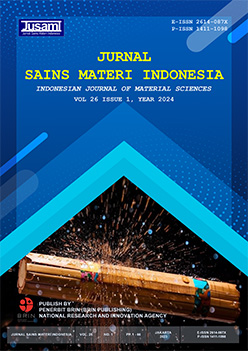Corrosion Resistant Support Materials (CRSM) as Potential Development of Technical Parameters for Biocompatibility Testing of Bone Implant Products
A Review
DOI:
https://doi.org/10.55981/jsmi.2024.3130Keywords:
Anticorrosive material, Anticorrosive method, Biocompatible, Bone implant, Technical parametersAbstract
This study aims to describe the risk of bone implant material 316L-SS by identifying the material or materials or methods that are able to withstand the rate of corrosion or anti-corrosion. The method used is a literature study supported by tabulation data processing instruments, mind mapping, and fishbone diagrams. All journal literature is collected, grouped, carefully identified and scored to obtain information regarding its anti-corrosive material. The results show that corrosion of 316L can be coated with an anti-corrosive support material as follows: 1) Alumina Sol-Gel, 2) Silane, 3) Parylene, 4) Niobium Oxide (Nb2O5), 5) 0.01%SS, 6) MgO/Tb,Eu-HAP, 7) Ti6Al4V coated HAP 40 micrometers, 8) HAP+HNO3, 9) Nano-HA, 10) Samarium- Gadolinium-HAP (Sm/Gd-HAP), 11) Nano-Thin Film Hydroxyapatite polylactic acid (nHA-PLA), 12) Multiwall Carbon Nanotube, 13) f-MWCNT, 14) Ag-HA/f-MWCNT nanocomposite, 15) nano HAP, 16) nano TiO2, 17) Double-HA, 18 ) Titanium ions, 19) Superhydrophilic TNT, 20) Superhydrophobic TNT, and 21) Ti-Nb-Zr-Ta6. Each element that coats 316L-SS has different characteristics of advantages, but unfortunately all existing literature does not explain the technical advantages of each type of CRSM. The advantages are explained by comparing the coating elements with one another.
Downloads
References
A Kajzer, M Antonowicz… - Archives of Metallurgy and …, 2018 - yadda.icm.edu.pl
Afzali, Ghomashchi, & Oskouei. (2019). On the Corrosion Behaviour of Low Modulus Titanium Alloys for Medical Implant Applications: A Review. Metals, 9(8), 878. doi:10.3390/met9080878
Aksakal, B., Gavgali, M. & Dikici, B. The Effect of Coating Thickness on Corrosion Resistance of Hydroxyapatite Coated Ti6Al4V and 316L SS Implants. J. of Materi Eng and Perform 19, 894–899 (2010). https://doi.org/10.1007/s11665-009-9559-7
Aksakal, B., Yildirim, Ö.S. & Gul, H. Metallurgical failure analysis of various implant materials used in orthopedic applications. J Fail. Anal. and Preven. 4, 17–23 (2004). https://doi.org/10.1007/s11668-996-0007-9
Samuel S, Nag S, Nasrazadani S, Ukirde V, El Bouanani M, Mohandas A, Nguyen K, Banerjee R. Corrosion resistance and in vitro response of laser-deposited Ti-Nb-Zr-Ta alloys for orthopedic implant applications. J Biomed Mater Res A. 2010 Sep 15;94(4):1251-6. doi: 10.1002/jbm.a.32782. PMID: 20694992.
Aparicio, C., Javier Gil, F., Fonseca, C., Barbosa, M., & Planell, J. A. (2003). Corrosion behaviour of commercially pure titanium shot blasted with different materials and sizes of shot particles for dental implant applications. Biomaterials, 24(2), 263–273. doi:10.1016/s0142-9612(02)00314-9
Asl, S. M., Ganjali, M., & Karimi, M. (2019). Surface modification of 316L stainless steel by laser-treated HA-PLA nanocomposite films toward enhanced biocompatibility and corrosion-resistance in vitro. Surface and Coatings Technology. doi:10.1016/j.surfcoat.2019.02.052
Asri, R. I. M., Harun, W. S. W., Samykano, M., Lah, N. A. C., Ghani, S. A. C., Tarlochan, F., & Raza, M. R. (2017). Corrosion and surface modification on biocompatible metals: A review. Materials Science and Engineering: C, 77, 1261–1274. doi:10.1016/j.msec.2017.04.102
Assadian, M., Jafari, H., Ghaffari Shahri, S. M., Idris, M. H., & Gholampour, B. (2014). Corrosion resistance of EPD nanohydroxyapatite coated 316L stainless steel. Surface Engineering, 30(11), 806–813. doi:10.1179/1743294414y.0000000330
Azab, S. M., & Fekry, A. M. (2017). A novel electrochemical determination for the anti-osteoporosis drug (alendronate sodium) and its application for corrosion monitoring of surgical 316 L SS bone implant. Journal of Alloys and Compounds, 717, 25–30. doi:10.1016/j.jallcom.2017.05.016
Aziz-Kerrzo, M., Conroy, K. G., Fenelon, A. M., Farrell, S. T., & Breslin, C. B. (2001). Electrochemical studies on the stability and corrosion resistance of titanium-based implant materials. Biomaterials, 22(12), 1531–1539. doi:10.1016/s0142-9612(00)00309-4
Beddoes, J., Bucci, K. The influence of surface condition on the localized corrosion of 316L stainless steel orthopaedic implants. Journal of Materials Science: Materials in Medicine 10, 389–394 (1999). https://doi.org/10.1023/A:1008918929036
BM Shafiee, R Torkaman, M Mahmoudi… - Progress in Organic …, 2019 – Elsevier
Brooks, E. K., Brooks, R. P., & Ehrensberger, M. T. (2017). Effects of simulated inflammation on the corrosion of 316L stainless steel. Materials Science and Engineering: C, 71, 200–205. doi:10.1016/j.msec.2016.10.012
Chang, S.-H., Chen, J.-Z., Hsiao, S.-H., & Lin, G.-W. (2014). Nanohardness, corrosion and protein adsorption properties of CuAlO2 films deposited on 316L stainless steel for biomedical applications. Applied Surface Science, 289, 455–461. doi:10.1016/j.apsusc.2013.11.004
Chew, K. , Zein, S. and Ahmad, A. (2012) The corrosion scenario in human body: Stainless steel 316L orthopaedic implants. Natural Science, 4, 184-188. doi: 10.4236/ns.2012.43027.
D Sivaraj, K Vijayalakshmi (2019), Novel synthesis of bioactive hydroxyapatite/f-multiwalled carbon nanotube composite coating on 316L SS implant for substantial corrosion resistance and antibacterial activity - Journal of Alloys and Compounds, 2019 - Elsevier
Dadfar, M., Fathi, M. H., Karimzadeh, F., Dadfar, M. R., & Saatchi, A. (2007). Effect of TIG welding on corrosion behavior of 316L stainless steel. Materials Letters, 61(11-12), 2343–2346. doi:10.1016/j.matlet.2006.09.008
Durairaj, S., Kalimuthu, V., Arumugam, G., & Rajendran, R. (2020). Tailoring Cu substituted hydroxyapatite/functionalized multiwalled carbon nanotube composite coating on 316L SS implant for enhanced corrosion resistance, antibacterial and bioactive properties. International Journal of Pharmaceutics, 119946. doi:10.1016/j.ijpharm.2020.119946
Durairaj, S., Kalimuthu, V., Arumugam, G., & Rajendran, R. (2020). Tailoring Cu substituted hydroxyapatite/functionalized multiwalled carbon nanotube composite coating on 316L SS implant for enhanced corrosion resistance, antibacterial and bioactive properties. International Journal of Pharmaceutics, 119946. doi:10.1016/j.ijpharm.2020.119946
Bombara, G., & Cavallini, M. (1977). Stress corrosion cracking of bone implants. Corrosion Science, 17(2), 77–85. doi:10.1016/0010-938x(77)90010-5
Manivasagam, G., Dhinasekaran, D., & Rajamanickam, A. (2010). Biomedical implants: corrosion and its prevention-a review. Recent patents on corrosion science, 2(1).
Gervais, B., Vadean, A., Raison, M., & Brochu, M. (2016). Failure analysis of a 316L stainless steel femoral orthopedic implant. Case Studies in Engineering Failure Analysis, 5-6, 30–38. doi:10.1016/j.csefa.2015.12.001
Gil, L., Brühl, S., Jiménez, L., Leon, O., Guevara, R., & Staia, M. H. (2006). Corrosion performance of the plasma nitrided 316L stainless steel. Surface and Coatings Technology, 201(7), 4424–4429. doi:10.1016/j.surfcoat.2006.08.081
Gnanavel, S., Ponnusamy, S., Mohan, L. et al. In Vitro Corrosion Behaviour of Ti–6Al–4V and 316L Stainless Steel Alloys for Biomedical Implant Applications. J Bio Tribo Corros 4, 1 (2018). https://doi.org/10.1007/s40735-017-0118-8
González, J. E. ., & Mirza-Rosca, J. . (1999). Study of the corrosion behavior of titanium and some of its alloys for biomedical and dental implant applications. Journal of Electroanalytical Chemistry, 471(2), 109–115. doi:10.1016/s0022-0728(99)00260-0
Haynes, D. R., Crotti, T. N., & Haywood, M. R. (2000). Corrosion of and changes in biological effects of cobalt chrome alloy and 316L stainless steel prosthetic particles with age. Journal of Biomedical Materials Research, 49(2), 167–175. doi:10.1002/(sici)1097- 4636(200002)49:2<167::aid-jbm3>3.0.co;2-9
Huang, Q., Yang, Y., Hu, R., Lin, C., Sun, L., & Vogler, E. A. (2015). Reduced platelet adhesion and improved corrosion resistance of superhydrophobic TiO2-nanotube-coated 316L stainless steel. Colloids and Surfaces B: Biointerfaces, 125, 134– 141. doi:10.1016/j.colsurfb.2014.11.028
Geringer, J., Forest, B., & Combrade, P. (2005). Fretting-corrosion of materials used as orthopaedic implants. Wear, 259(7-12), 943–951. doi:10.1016/j.wear.2004.11.027
Jokar, M., Darvishi, S., Torkaman, R., Kharaziha, M., & Karbasi, M. (2016). Corrosion and bioactivity evaluation of nanocomposite PCL- forsterite coating applied on 316L stainless steel. Surface and Coatings Technology, 307, 324–331. doi:10.1016/j.surfcoat.2016.08.094
Feng, K., Cai, X., Li, Z., & Chu, P. K. (2012). Improved corrosion resistance of stainless steel 316L by Ti ion implantation. Materials Letters, 68, 450–452. doi:10.1016/j.matlet.2011.11.014
Kamachimudali, U., Sridhar, T.M. & Raj, B. Corrosion of bio implants. Sadhana 28, 601–637 (2003). https://doi.org/10.1007/BF02706450 Kannan, S., Balamurugan, A., & Rajeswari, S. (2004). H2SO4 as a passivating medium on the localised corrosion resistance of surgical
Kannan, S., Balamurugan, A., & Rajeswari, S. (2004). H2SO4 as a passivating medium on the localised corrosion resistance of surgical 316L SS metallic implant and its effect on hydroxyapatite coatings. Electrochimica Acta, 49(15), 2395–2403. doi:10.1016/j.electacta.2004.01.003
Kannan, S., Balamurugan, A., & Rajeswari, S. (2005). Electrochemical characterization of hydroxyapatite coatings on HNO3 passivated 316L SS for implant applications. Electrochimica Acta, 50(10), 2065–2072. doi:10.1016/j.electacta.2004.09.015
Karamian, E., Kalantar Motamedi, M. R., Khandan, A., Soltani, P., & Maghsoudi, S. (2014). An in vitro evaluation of novel NHA/zircon plasma coating on 316L stainless steel dental implant. Progress in Natural Science: Materials International, 24(2), 150–156. doi:10.1016/j.pnsc.2014.04.001
Khosravi, F., Nouri Khorasani, S., Rezvani Ghomi, E., Karimi Kichi, M., Zilouei, H., Farhadian, M., & Esmaeely Neisiany, R. (2019). A bilayer GO/nanofibrous biocomposite coating to enhance 316L stainless steel corrosion performance. Materials Research Express. doi:10.1088/2053-1591/ab26d5
KM Golasiński, R Detsch, M Szklarska… Boccacini AR. 2021. Evaluation of mechanical properties, in vitro corrosion resistance and biocompatibility of Gum Metal in the context of implant applications. Journal of the Mechanical Behavior of Biomedical Materials 115, 2021 - Elsevier. doi: https://doi.org/10.1016/j.jmbbm.2020.104289
Cieślik, M., Engvall, K., Pan, J., & Kotarba, A. (2011). Silane–parylene coating for improving corrosion resistance of stainless steel 316L implant material. Corrosion Science, 53(1), 296–301. doi:10.1016/j.corsci.2010.09.034
M. Assadian, H. Jafari, S. M. Ghaffari Shahri, M. H. Idris & B. Gholampour (2014) Corrosion resistance of EPD nanohydroxyapatite coated 316L stainless steel, Surface Engineering, 30:11, 806-813, DOI: 10.1179/1743294414Y.0000000330
Manonmani, R. Deposition of biocompatible nano biocomposite layers on 316L SS surface for bone implant applications. J IRAN CHEM SOC 18, 1127–1136 (2021). https://doi.org/10.1007/s13738-020-02097-5
Kannan, M. B., & Wallipa, O. (2013). Potentiostatic pulse-deposition of calcium phosphate on magnesium alloy for temporary implant applications — An in vitro corrosion study. Materials Science and Engineering: C, 33(2), 675–679. doi:10.1016/j.msec.2012.10.017
Fathi, M. ., Salehi, M., Saatchi, A., Mortazavi, V., & Moosavi, S. . (2003). In vitro corrosion behavior of bioceramic, metallic, and bioceramic–metallic coated stainless steel dental implants. Dental Materials, 19(3), 188–198. doi:10.1016/s0109-5641(02)00029-5.
Morais, S., Sousa, J. P., Fernandes, M. H., Carvalho, G. S., de Bruijn, J. D., & van Blitterswijk, C. A. (1998). Effects of AISI 316L corrosion products in in vitro bone formation. Biomaterials, 19(11-12), 999–1007. doi:10.1016/s0142-9612(97)00234-2
Muley, S. V., Vidvans, A. N., Chaudhari, G. P., & Udainiya, S. (2016). An assessment of ultra fine grained 316L stainless steel for implant applications. Acta Biomaterialia, 30, 408–419. doi:10.1016/j.actbio.2015.10.043
Nasr, A., Gawad, S.A. & Fekry, A.M. A Sensor for Monitoring the Corrosion Behavior of Orthopedic Drug Calcium Hydrogen Phosphate on a Surgical 316L Stainless Steel Alloy as Implant. J Bio Tribo Corros 6, 36 (2020). https://doi.org/10.1007/s40735-020-0334-5.
Nasution, A. K., Ulum, M. F., Kadir, M. R. A., & Hermawan, H. (2017). Mechanical and corrosion properties of partially degradable bone screws made of pure iron and stainless steel 316L by friction welding. Science China Materials, 61(4), 593–606. doi:10.1007/s40843-017-9057-3
Nielsen, K. (1987). Corrosion of metallic implants. British Corrosion Journal, 22(4), 272–278. doi:10.1179/000705987798271352 NS Manam, WSW Harun, DNA Shri, SAC Ghani… - Journal of Alloys and …, 2017 - Elsevier
Parsapour, A., Khorasani, S. N., & Fathi, M. H. (2012). Effect of Surface Treatment and Metallic Coating on Corrosion Behavior and Biocompatibility of Surgical 316L Stainless Steel Implant. Journal of Materials Science & Technology, 28(2), 125–131. doi:10.1016/s1005-0302(12)60032-2
Pattanayak, S., Panda, S., & Dhupal, D. (2020). Laser micro drilling of 316L stainless steel orthopedic implant: A study. Journal of Manufacturing Processes, 52, 220–234. doi:10.1016/j.jmapro.2020.01.042
Puleo, D. A., Holleran, L. A., Doremus, R. H., & Bizios, R. (1991). Osteoblast responses to orthopedic implant materialsin vitro. Journal of Biomedical Materials Research, 25(6), 711–723. doi:10.1002/jbm.820250603
Rakesh, K. R., Bontha, S., Ramesh, M. R., Das, M., & Balla, V. K. (2019). Laser surface melting of Mg-Zn-Dy alloy for better wettability and corrosion resistance for biodegradable implant applications. Applied Surface Science. doi:10.1016/j.apsusc.2019.02.167
S Kumar, TSNS Narayanan. 2008. Corrosion behaviour of Ti–15Mo alloy for dental implant applications. Journal of Dentistry 36 (7): 500 507. doi: https://doi.org/10.1016/j.jdent.2008.03.007.
Sathishkumar, S., Louis, K., Shinyjoy, E., & Gopi, D. (2016). Tailoring the Sm/Gd-Substituted Hydroxyapatite Coating on Biomedical AISI 316L SS: Exploration of Corrosion Resistance, Protein Profiling, Osteocompatibility, and Osteogenic Differentiation for Orthopedic Implant Applications. Industrial & Engineering Chemistry Research, 55(22), 6331–6344. doi:10.1021/acs.iecr.5b04329
Sathishkumar, S., Sridevi, C., Rajavel, R., & Karthikeyan, P. (2020). Smart flower like MgO/Tb,Eu-substituted hydroxyapatite dual layer coating on 316L SS for enhanced corrosion resistance, antibacterial activity and osteocompatibility. Journal of Science: Advanced Materials and Devices. doi:10.1016/j.jsamd.2020.09.007
Seah, K. H. W., Thampuran, R., & Teoh, S. H. (1998). The influence of pore morphology on corrosion. Corrosion Science, 40(4-5), 547– 556. doi:10.1016/s0010-938x(97)00152-2
Sharifnabi, A., Fathi, M. H., Eftekhari Yekta, B., & Hossainalipour, M. (2014). The structural and bio-corrosion barrier performance of Mg- substituted fluorapatite coating on 316L stainless steel human body implant. Applied Surface Science, 288, 331–340.
Shi, Y., Qi, M., Chen, Y., & Shi, P. (2011). MAO-DCPD composite doi:10.1016/j.apsusc.2013.10.029coating on Mg alloy for degradable implant applications. Materials Letters, 65(14), 2201–2204. doi:10.1016/j.matlet.2011.04.037
Singh, G., Lamichhane, Y., Bhui, A. S., Sidhu, S. S., Bains, P. S., & Mukhiya, P. (2019). Surface morphology and microhardness behavior of 316l in hap-pmedm. Facta Universitatis, Series: Mechanical Engineering, 17(3), 445–454. https://doi.org/10.22190/FUME190510040S
Sivakumar, M., Rajeswari, S. Investigation of failures in stainless steel orthopaedic implant devices: pit-induced stress corrosion cracking. J Mater Sci Lett 11, 1039–1042 (1992). https://doi.org/10.1007/BF00729754
Sivaraj D, Vijayalakshmi K. Enhanced antibacterial and corrosion resistance properties of Ag substituted hydroxyapatite/functionalized multiwall carbon nanotube nanocomposite coating on 316L stainless steel for biomedical application. Ultrason Sonochem. 2019 Dec;59:104730. doi: 10.1016/j.ultsonch.2019.104730. Epub 2019 Aug 12. PMID: 31442768.
Sivaraj, D., & Vijayalakshmi, K. (2018). Enhanced corrosion resistance and antibacterial activity of Zn-HA decorated MWCNTs film coated on medical grade 316L SS implant by novel spray pyrolysis technique. Journal of Analytical and Applied Pyrolysis. doi:10.1016/j.jaap.2018.06.006
Sivaraj, D., & Vijayalakshmi, K. (2018). Novel synthesis of bioactive hydroxyapatite/f-multiwalled carbon nanotube composite coating on 316L SS implant for substantial corrosion resistance and antibacterial activity. Journal of Alloys and Compounds. doi:10.1016/j.jallcom.2018.10.341
Sivaraj, D., & Vijayalakshmi, K. (2019). Enhanced antibacterial and corrosion resistance properties of Ag substituted hydroxyapatite/functionalized multiwall carbon nanotube nanocomposite coating on 316L stainless steel for biomedical application. Ultrasonics Sonochemistry, 104730. doi:10.1016/j.ultsonch.2019.104730
SYRETT, B. C., & WING, S. S. (1978). Pitting Resistance of New and Conventional Orthopedic Implant Materials—Effect of Metallurgical Condition. CORROSION, 34(4), 138–148. doi:10.5006/0010-9312-34.4.138
Tiwari, S. K., Mishra, T., Gunjan, M. K., Bhattacharyya, A. S., Singh, T. B., & Singh, R. (2007). Development and characterization of sol–gel silica–alumina composite coatings on AISI 316L for implant applications. Surface and Coatings Technology, 201(16-17), 7582– 7588. doi:10.1016/j.surfcoat.2007.02.026
Ur Rahman, Z., Deen, K. M., Cano, L., & Haider, W. (2017). The effects of parametric changes in electropolishing process on surface properties of 316L stainless steel. Applied Surface Science, 410, 432–444. doi:10.1016/j.apsusc.2017.03.081
Xi, T., Shahzad, M. B., Xu, D., Sun, Z., Zhao, J., Yang, C., … Yang, K. (2017). Effect of copper addition on mechanical properties, corrosion resistance and antibacterial property of 316L stainless steel. Materials Science and Engineering: C, 71, 1079–1085. doi:10.1016/j.msec.2016.11.022
Yang, H., Yang, K., & Zhang, B. (2007). Pitting corrosion resistance of La added 316L stainless steel in simulated body fluids. Materials Letters, 61(4-5), 1154–1157. doi:10.1016/j.matlet.2006.06.071
Yu, J., Zhao, Z. J., & Li, L. X. (1993). Corrosion fatigue resistances of surgical implant stainless steels and titanium alloy. Corrosion Science, 35(1-4), 587–597. doi:10.1016/0010-938x(93)90193-k
Downloads
Published
How to Cite
Issue
Section
License
Copyright (c) 2024 Endi Hari Purwanto, Reza, Bendjamin BL., Budhy Basuki, Putty Anggraeni, Nur Tjahyo Eka Darmayanti

This work is licensed under a Creative Commons Attribution-ShareAlike 4.0 International License.








